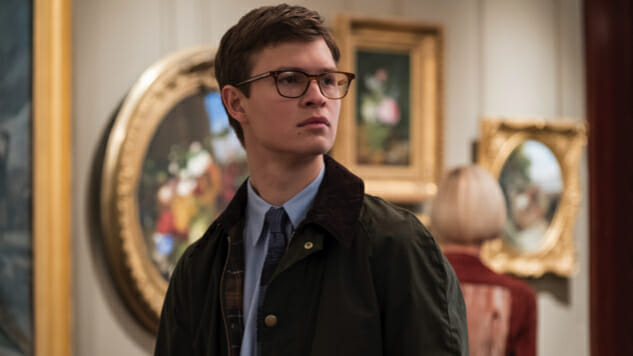The Beautiful Mess of The Goldfinch
Wrecked by bad reviews, The Goldfinch is clearly a mess. But what if all that mess has meaning?
Images via Macall Polay/Warner Bros., WaterTower Music
The scenes in Theo’s life are disjointed: of him both as a young boy enduring the aftermath of a terrorist bombing at the Metropolitan Museum of Art, and as an adult who compensates for his anxiety and anonymity by fraudulently selling “Frankenstein”-like “antiques” made from parts both genuine and generic. Unpredictably, from one line reading to the next, these scenes in The Goldfinch are subdued, or explosive with emotion, or stilted, or overwrought, or calibrated perfectly, or any combination of the above. The older, spindly, mustache-twirling villain of a buyer (Dennis O’Hare, gaunt and gay), who catches Theo in his con, refers to these conterfeit wares as “changelings.” So, too, is the film itself: Theo’s memories skip around; time folds in on itself; emotional, neurological, temporal and physical connections link and shatter with little logic. Plunging into the depths of its lead’s subjectivity, a character whose life has been transformed by trauma and loss,The Goldfinch is as displaced and dissociative as its lead, and that’s the way it should be.
Theo’s mother dies in the bombing, visions of looking for her between curtains of ash flooding his unwaking mind, but his mother (and his survival) isn’t the only thing that haunts him: Unspoken desire, perhaps of the queer kind, also lingers there, too. That he took a pause to not follow his mother as she searched for Rembrandt’s The Anatomy Lesson, surviving the tragedy; that he, instead, momentarily let his gaze wander, that one moment possibly changing everything he knows about looking, wanting, having—it keeps him in a stranglehold of guilt, shaping his conception of intimacy for the rest of his life. The closest relationship he had was wrenched from him in seconds. No wonder why The Goldfinch’s every scene feels strange, alien even, as if Theo’s attachments will forever be disordered.
Events in Amsterdam, which do not reveal themselves until the latter third of the film, send Theo back in time, his memories—in relation to family, love and artifacts, the hope that they hold and fail to provide—whirl around in a slipstream, the association between a scene of his youth and one of his recent adulthood obvious at times, obscure at others. Perhaps the wounds of loss and destructive desire have forced him to always recontextualize these scenarios, rebuilding and replaying them on a loop as he dances on the precipice of death, pills lined up on a fancy bureau in a Dutch hotel, drinking himself into oblivion.
-

-

-

-

-

-

-

-

-

-

-

-

-

-

-

-

-

-

-

-

-

-

-

-

-

-

-

-

-

-

-

-

-

-

-

-

-

-

-

-








































